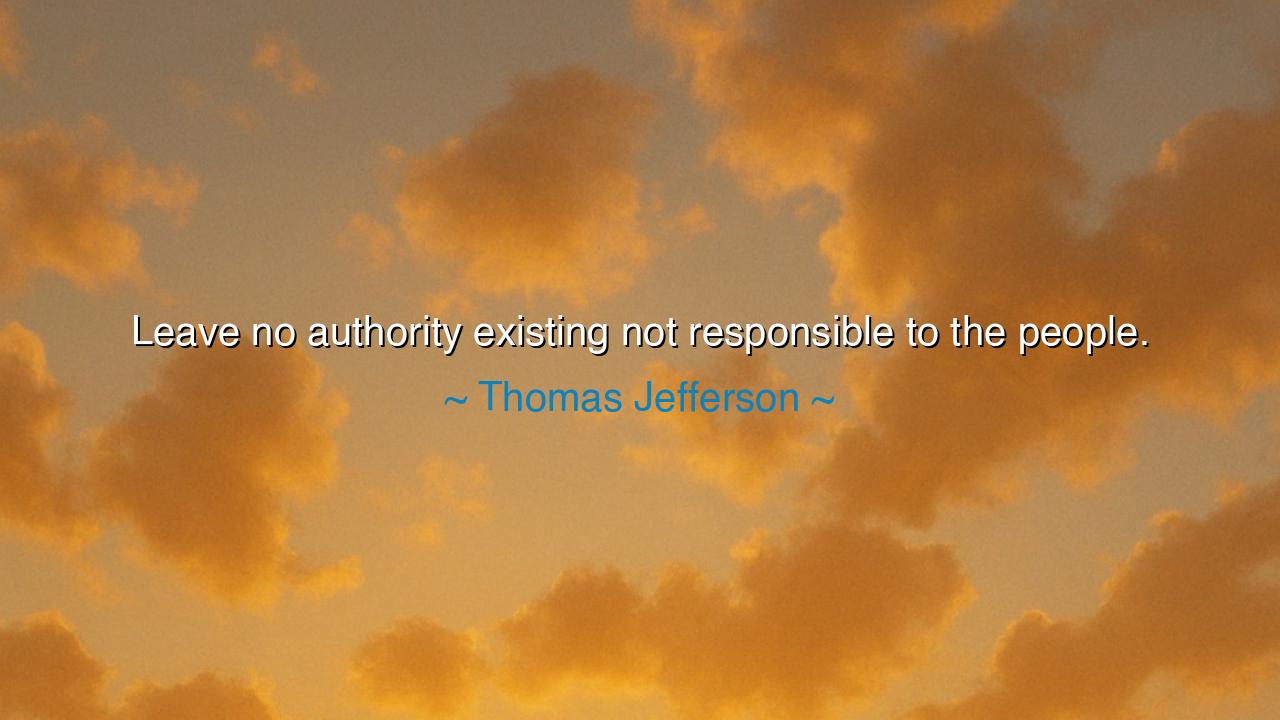
Leave no authority existing not responsible to the people.






“Leave no authority existing not responsible to the people.” These words from Thomas Jefferson speak to the fundamental principle of democratic governance: that power must always be answerable to the will and welfare of the people. Jefferson, a founding father of the United States, understood that true freedom and justice could not exist where unchecked authority was allowed to flourish. He argued that power, whether political, economic, or social, must always be transparent, accountable, and subject to the oversight of the citizens it serves. To allow any authority to remain unaccountable is to invite corruption and tyranny, where the interests of the few are placed above the rights of the many.
The ancients were deeply aware of the dangers of absolute power and the importance of accountability. In Athens, the birthplace of democracy, the philosopher Socrates warned against the concentration of authority in the hands of a single ruler or small elite. The Athenian democracy was built on the idea that those in positions of power should always be held accountable by the people. Pericles, the great Athenian leader, understood that the health of the state depended on the participation and vigilance of its citizens, ensuring that no ruler could act without the approval of the people. Like Jefferson, the Athenian thinkers valued the idea that power must always be subject to the will of the people, lest it be abused.
Consider the example of King Charles I of England, whose disregard for the will of the people and his attempts to rule without the consent of Parliament led to the English Civil War. Charles I believed in the divine right of kings, a notion that placed his authority beyond reproach. Yet, his refusal to acknowledge the rights and authority of the people ultimately led to his downfall. The English people rose against him, and he was executed in 1649. The lesson here is clear: when authority is not held accountable to the people, it becomes tyrannical and dangerous. The power of the people must always be recognized and respected, or it will result in rebellion and destruction.
In Jefferson’s time, this concept of responsible governance was not just theoretical, but the driving force behind the American Revolution. The colonies had lived under the tyranny of King George III, who imposed laws and taxes without the consent of the governed. The Declaration of Independence, written by Jefferson, proclaimed that all men have the right to govern themselves, and that government should only exist to serve the will of the people. The revolution was not merely a political struggle, but a fight to ensure that no authority would ever again stand above the people it was meant to serve.
In modern times, Jefferson’s words remain as relevant as ever. Around the world, we continue to see the effects of unaccountable power. From authoritarian regimes to corrupt governments, the people often find their voices silenced, their rights trampled upon, and their futures dictated by a few. Yet, Jefferson’s vision of a world where all authority is answerable to the people continues to inspire movements for freedom and democracy. Accountability remains the bedrock of just governance, and without it, no nation can thrive in true freedom.
In conclusion, Thomas Jefferson’s plea for accountable authority speaks to the eternal truth that no ruler, no institution, no power, is above the will of the people. Power is only legitimate when it is exercised in the service of those who give it authority. Whether in the time of the ancients or in our modern world, the struggle for democracy and freedom remains the fight for accountable leadership. Jefferson's vision reminds us that the true strength of any government lies in its responsiveness to the needs and rights of its citizens, and in its willingness to be held accountable by them.






NTNhan Thanh
This perspective makes me think about historical and contemporary examples of leadership. Are there times when authorities failed because they weren’t directly answerable to the public? Conversely, can public pressure sometimes hinder long-term planning? I’d like to hear an analysis on practical frameworks that ensure accountability without sacrificing competence. Could technology, such as transparency platforms, provide a solution, or is this inherently a philosophical challenge tied to the nature of power itself?
TNDang Thanh Nam
I feel a sense of urgency and empowerment from this idea. It suggests that no power should be immune to public responsibility. But it also makes me question the limits of authority—should some decisions remain insulated from public opinion for strategic reasons? How do we strike a balance between accountability and expertise, especially in complex issues like national security, public health, or economic policy? Is there a risk of populism undermining necessary leadership?
QNManh Quan Nguyen
Reading this makes me reflect on modern governance. Are we genuinely holding every authority responsible to the people, or do bureaucratic layers dilute accountability? It feels idealistic yet challenging in practice. I wonder if the quote implies a form of continuous scrutiny by citizens, and if so, how realistic is it for people to remain vigilant constantly? Could this lead to excessive interference or a productive form of civic engagement?
TLThien Le
This statement sparks my curiosity about the balance between authority and accountability. How do we define which powers should be directly answerable to the public, and are there situations where certain authorities might justifiably operate independently? It raises concerns about oversight mechanisms and transparency. Should we rely solely on elections, or are there other ways to ensure that all governing bodies truly reflect the will of the people without compromising efficiency or security?